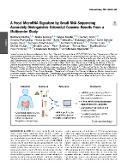A Fecal MicroRNA Signature by Small RNA Sequencing Accurately Distinguishes Colorectal Cancers: Results From a Multicenter Study

Autor
Pardini, Barbara
Ferrero, Giulio
Tarallo, Sonia
Gallo, Gaetano
Francavilla, Antonio
Licheri, Nicola
Trompetto, Mario
Clerico, Giuseppe
Senore, Carlo
Peyre, Sergio
Macinga, Peter
Hucl, Tomas
Budinska, Eva
Cordero, Francesca
Naccarati, Alessio
Datum vydání
2023Publikováno v
GastroenterologyRočník / Číslo vydání
165 (3)ISBN / ISSN
ISSN: 0016-5085Informace o financování
MSM//LX22NPO5102
GA0/GA/GA17-16857S
GA0/GA/GA22-05942S
UK/COOP/COOP
Metadata
Zobrazit celý záznamKolekce
Tato publikace má vydavatelskou verzi s DOI 10.1053/j.gastro.2023.05.037
Abstrakt
BACKGROUND & AIMS: Fecal tests currently used for colorectal cancer (CRC) screening show limited accuracy in detecting early tumors or precancerous lesions. In this respect, we comprehensively evaluated stool microRNA (miRNA) profiles as biomarkers for non-invasive CRC diagnosis. METHODS: A total of 1,273 small RNA sequencing experiments were performed in multiple biospecimens. In a cross-sectional study, miRNA profiles were investigated in fecal samples from an Italian and a Czech cohort (155 CRC, 87 adenomas, 96 other intestinal diseases, 141 colonoscopy-negative controls). A predictive miRNA signature for cancer detection was defined by a machine learning strategy and tested in additional fecal samples from 141 CRC and 80 healthy volunteers. miRNA profiles were compared with those of 132 tumor/adenoma paired with adjacent mucosa, 210 plasma extracellular vesicles samples, and 185 fecal immunochemical tests (FIT) leftover samples. RESULTS: Twenty-five miRNAs showed altered levels in stool of CRC patients in both cohorts (adj. P<.05). A five-miRNA signature, including miR-149-3p, miR-607-5p, miR-1246, miR-4488, and miR-6777-5p, distinguished patients from controls (AUC=0.86, 95% CI=0.79-0.94) and was validated in an independent cohort (AUC=0.96, 95% CI=0.92-1.00). The signature classified controls from low-/high-stage tumors, and advanced adenomas (AUC=0.82, 95% CI=0.71-0.97). Tissue miRNA profiles mirrored those of stool samples, while fecal profiles of different gastrointestinal diseases highlighted miRNAs specifically dysregulated in CRC. miRNA profiles in FIT leftover samples showed good correlation with those of stool collected in preservative buffer and their alterations can be detected in adenoma or CRC patients. CONCLUSIONS: Our comprehensive fecal miRNome analysis identified a signature accurately discriminating cancer aimed at improving a non-invasive diagnosis and screening strategies.
Klíčová slova
stool microRNAs, non-invasive diagnosis, small RNA sequencing, colorectal cancer, precancerous lesions, machine learning
Trvalý odkaz
https://hdl.handle.net/20.500.14178/2109Licence
Licence pro užití plného textu výsledku: Creative Commons Uveďte původ-Neužívejte dílo komerčně-Nezpracovávejte 4.0 International







